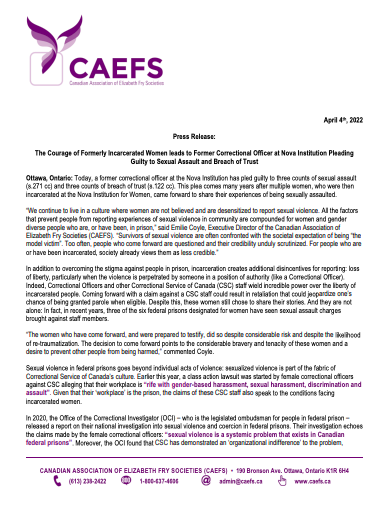CAEFS Response to the Office of the Correctional Investigators 2021-2022 Annual Report: Binding Oversight and Meaningful Change is Needed
11/9/2022Wednesday, November 9th, 2022 (Ottawa, Ontario): The Canadian Association of Elizabeth Fry Societies (CAEFS) welcomes the Office of the Correctional Investigators (OCI) 2021-2022 Annual Report released on November 1st, 2022.
Last year, the OCI published “A Review of Women’s Corrections 30-Years since Creating Choices”, within the 2020-2021 annual report. This report made clear that, not only have the original issues that Creating Choices sought to resolve not been addressed but, in myriad ways, the conditions experienced by federally incarcerated women and gender-diverse people have continually worsened.
In this year’s report, the OCI provides substantive updates on two landmark reports: “A Case Study on Diversity in Corrections: The Black Inmate Experience in Federal Corrections” and “Spirit Matters: Aboriginal People and the Corrections and Conditional Release Act”, both published by the OCI in 2013. Unfortunately, like with “Creating Choices” so many of the issues identified in these reports have gone unaddressed or inadequately addressed by the Correctional Service of Canada, to the detriment of both incarcerated Black and Indigenous peoples.
“The anti-Black racism experienced by Black women and gender-diverse people in community is even more prominent within the prisons. The women interviewed for the OCI report, highlight that CSC is not meeting such basic needs as proper personal care products, let alone addressing the systemic issues that disproportionally punish Black people in Canada,” said Emilie Coyle, the executive director of CAEFS. “Many of the experiences shared by the people in this report mirror what has been shared with CAEFS during our advocacy visits to the prisons designated for women, and we have raised them with prison management. Unfortunately, CSC’s responses to us are to point to existing policies, if they recognize that there is an issue at all. As the OCI report points out, CSC’s practice is not reflective of its policies.”
In our own review of the breadth of historical and current efforts undertaken by task forces, commissions, and oversights agencies (such as the OCI), it is clear that repeated calls for changes to our carceral system have not been acted on in meaningful ways. CAEFS continues to call for immediate action to be taken to create structures of binding authority that will ensure that the evidence and recommendations put forward by these oversight offices, commissions, and task forces are carried out, as we work towards the more transformative outcomes that the system and our communities so desperately need.
This year’s annual report also provides updates on ongoing national investigations, including issues that continue to be priorities for CAEFS’ advocacy efforts: Dry Cells. Structured Intervention Units, Over-representation of Indigenous Women in Secure Units (Maximum Security), Mother-Child Program.
What these investigations highlight is some of the specific ways in which CSC is not meeting the needs of people incarcerated at the federal prisons designated for women, and a persistent failure to use the legally obligated least restrictive measures. All despite significant intervention by external oversight and advocacy organizations.
“What these updates from the OCI demonstrate is that even when change is enacted by CSC, it is often done in superficial or narrow ways,” commented Coyle. “We saw this the change from administrative segregation to structured intervention units; we saw this with the extremely narrow legislative interpretation of the dry cell decision that continues to allow for indefinite solitary confinement; we see it in the failure to realize the full potential of the mother-child program across the prisons designated for women; and we see it in their insistence that maximum security units and the levels systems are needed and necessary, despite evidence and disproportionate negative impact on Indigenous women and gender-diverse people.”
For Comment:
Emilie Coyle
Executive Director, CAEFS
613-316-6785

